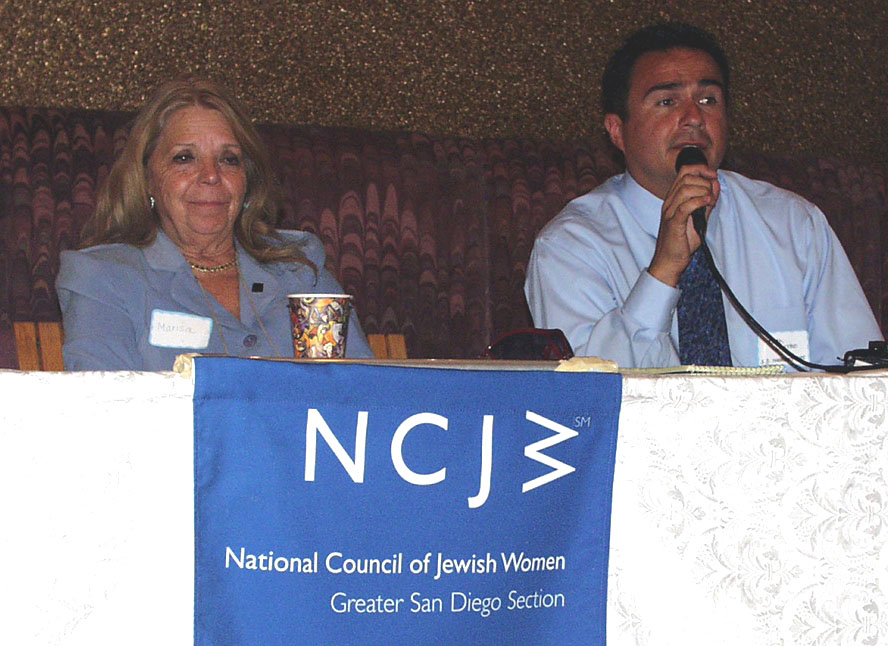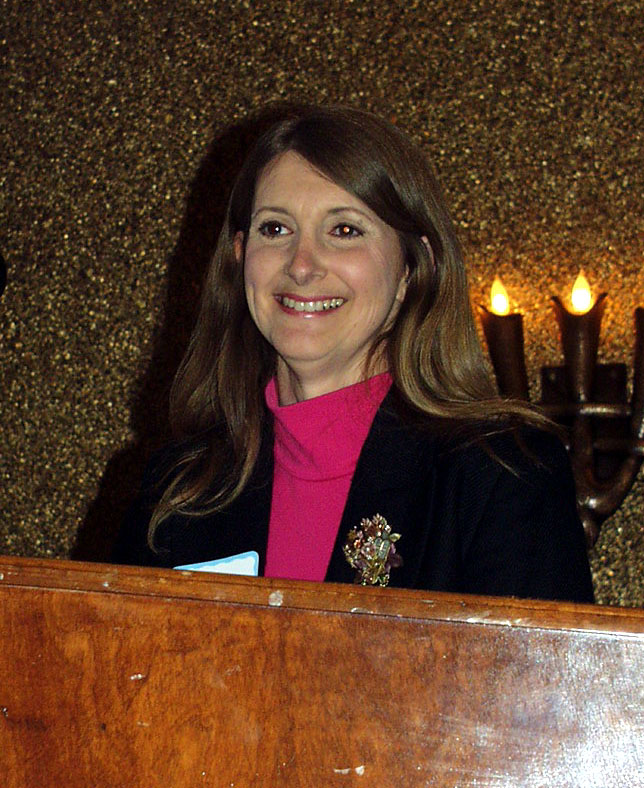|
By Donald H. Harrison
SAN DIEGO—Thousands of children, both girls and boys, are being lured into
prostitution and then kept as sexual slaves through intimidation and beatings.
Some are lured across the United States-Mexico border with promises of jobs to
help their families; others are recruited from San Diego County schools, parks,
shopping malls and via the Internet with promises of friendship and nice
clothing. Although law enforcement task forces have been formed in San
Diego County and elsewhere, the problem is growing, not diminishing.
 Deputy Sheriff Rick Castro, coordinator of the law enforcement task force on
human trafficking in San Diego County, and Marisa Ugarte, executive director of
the Bilateral Safety Corridor Coalition,
delivered this message on Monday evening, April 18, at a meeting of the San
Diego Chapter of the National Council of Jewish Women. NCJW board member
Nancy Woolman chaired the session that met in the sanctuary of Temple Emanu-El,
attracting about 35 persons.
Deputy Sheriff Rick Castro, coordinator of the law enforcement task force on
human trafficking in San Diego County, and Marisa Ugarte, executive director of
the Bilateral Safety Corridor Coalition,
delivered this message on Monday evening, April 18, at a meeting of the San
Diego Chapter of the National Council of Jewish Women. NCJW board member
Nancy Woolman chaired the session that met in the sanctuary of Temple Emanu-El,
attracting about 35 persons.
Ugarte, whose organization advocates for the protection of these youngsters on
both sides of
the U.S.-Mexico border and in other countries
Marisa Ugarte and Deputy Sheriff Rick Castro
around the world,
laid much of the blame for the growing problem on the concept that prostitution
is a "victimless crime." She said society must realize that even
if the sex between a prostitute and a customer is consensual, it is highly
likely that the prostitute is being forced by a human trafficker to remain a
prostitute.
Castro provided details of one such case, a 15-year-old girl who told the
trafficker she planned to leave. According to Castro, "the trafficker
told the johns (male customer) that they had to leave, then duct-taped her
hands and feet, unraveled a wire clothes hangar and beat her for two hours in
front of the other girls. He did it on her back so that a future customer
wouldn't see scars all over her while she was lying on her back." The
brutality not only punished the girl for considering leaving, it also
intimidated the other girls from considering following her example.
The two panelists told the Jewish women's organization that local gangs and
organized crime are increasing their activities in human trafficking, finding
forced prostitution a far more economical route to illicit profits than even the
illegal drug trade. Whereas drugs are sold once, and then consumed, the
prostitutes can be forced to have sex many times in a single day.
Furthermore, the girls can be trained through intimidation to lie to law
enforcement about their ages, their circumstances, and about for whom they are
working, Castro said.
The traffickers learn where the families of their victims live and threaten to
kill or harm them, if the youngsters ever attempt to leave, the deputy sheriff
added.
Besides in houses of prostitution, the girls are forced to work for "escort
services," in migrant worker camps, even near high schools. Ugarte
said the school district to a large extent turns a blind eye to the dangers that
students face, and expressed anger and frustration that officials of the San
Diego Unified School District prohibited the National Council for Jewish Women
from circulating a flyer for that evening's forum because, as one member
explained, NCJW is an "outside organization."
"All the problems in the schools and we can't get
in!" fumed Ugarte. She said she was personally aware of girls working
as prostitutes at both La Jolla High School and Hoover High School, in two
widely separated portions of the City of San Diego. The NCJW had attempted
unsuccessfully to circulate its information at Patrick Henry High School and at
two feeder junior high schools, Lewis and Pershing, all in the San Carlos
section of San Diego.
  In the question-and-answer session, the questions came quickly. How can
parents recognize the signs if their children are engaged in prostitution while
still living at home? They should watch for the children having an unusual
amount of cash, or gifts that the parents did not buy, responded Castro.
They should be alerted if their children are often going out without telling the
parents where. Furthermore, he said,
In the question-and-answer session, the questions came quickly. How can
parents recognize the signs if their children are engaged in prostitution while
still living at home? They should watch for the children having an unusual
amount of cash, or gifts that the parents did not buy, responded Castro.
They should be alerted if their children are often going out without telling the
parents where. Furthermore, he said,
Olga
Worm
Nancy Wollman
parents should check their children's
computers to determine to whom they are talking on such sites as "Craig's
List" and "My Space."
How are the children recruited? Traffickers look for distraught girls who are
sitting alone, or talking on their cell phone, girls who show a signs of
vulnerability or emotional weakness, Castro said. He said traffickers will
strike up sympathetic conversations with the girls, offer to buy them dinner,
find them a place to stay. Sometimes they will give them such other
presents as nice clothes. But after a few days, the situation
changes. The girls are told they have to start "turning tricks"
or else. In schools, the chief recruiters are other girls who are forced to lie
about the attractions of prostitution.
One girl said from a back row that she had grown up in group homes and had known
other girls who had gone into prostitution. She said when girls leave such
facilities, they often have no place to go. They can either go back to
jail or go on the street. Ugarte responded that often the only person waiting to
greet such a girl is the human trafficker.
Ugarte said the message must be spread and implemented that "no child
should be unprotected." She called on the NCJW to back construction
of shelters where victims can be protected, as opposed to "county group
homes where they are recruited." Castro said the NCJW should also
demand that the crime of human trafficking be put high on law enforcement's
priority list. It should urge people not to confuse "victimless
crimes" with the sexual bondage that children are being forced into.
At the beginning of the session, NCJW President Olga Worm commented that in the
late 1800s and early 1900s, one of the first projects undertaken by the
organization was to protect Jewish immigrant women "fresh off the boat from
being sold into prostitution." Castro said today there is no evidence
that the Jewish community is a particular target of human trafficking—the
problem being more rampant in non-English speaking immigrant communities, where
victims can be more easily isolated. But as recruiters in shopping malls
know, children from all socio-economic strata can be—and are—preyed upon.
|

